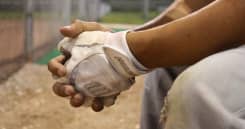It seems that some athletes are born to play the game of baseball, and Josh Hamilton is one of them. During his growing up years in North Carolina, Hamilton was a Little League champ and a star outfielder for his high school team. He was a local legend – a gifted player with a powerful pitch, and a first choice draft picks before he graduated high school. Those who knew him during those years say he was entirely focused on the game, never experimenting with tobacco, drugs or alcohol. Unfortunately, addiction got in the way, as it does all too often.
Josh Hamilton
Troubles began while the young athlete was still in the minor leagues. Hamilton, who had already caught the attention of the big leagues, was traveling with his parents when they were T-boned by a dump truck on their way to the rookie-level league in West Virginia, prior to the 2001 season. His mother was driving. All three were injured, and his parents had to return to North Carolina to recuperate. With too much money and too much time alone, Hamilton began hanging with a bad crowd, marking his entry to the world of drugs and alcohol.
Suspensions, Reinstatements, and Relapses
Hamilton played only 27 games during the 2001 season, and ended up on the disabled list, primarily from back injuries stemming from the accident. This period also marks Hamilton’s first attempt at rehab, after the Devil Rays spotted noticeable changes in the young player. A stint at the Betty Ford clinic lasted barely more than a week and marked a cycle of failed attempts at recovery interspersed with suspensions, reinstatements, and relapses.
It appeared, however, that things were looking up, and Hamilton had reportedly been clean for five months when he married his former classmate in 2004. Unfortunately, the couple separated and a restraining order was placed against Hamilton by the end of 2005. The same year, he was arrested for damaging a friend’s truck, followed by more suspensions.
Hamilton had been away from the game from an extended period when, seemingly at rock bottom, Hamilton moved in which his grandmother. At this point, Hamilton was out of options, sick, estranged from his wife and flat broke, having squandered his money on booze and drugs. Sometimes grandmothers are angels in disguise, especially when they get tough. Ultimately, Hamilton’s grandmother confronted him and urged him to return to the God he had accepted as a youth. He also received a call from his wife, who told him she believed God would let him back into the game of baseball.

Everybody who knew Eric Show said he was a guy who marched to the beat of a different drum. He also struggled with a demon that unfortunately killed him.
More infoBack in the Game
Hamilton moved to a Christian baseball academy in Florida, where he worked in exchanged for a room, board and time on the field. Newly dedicated to recovery, Hamilton cooked, cleaned, worked with kids, and attended regular Bible study. He also got serious, grew up, and began the hard work of repairing his relationship with his wife, and was eventually reinstated by Major League Baseball.
Unfortunately, Hamilton relapsed in 2009, reportedly followed by a second relapse in 2012 and a third in 2015. He admitted all three to MLB officials and is required to comply with the league’s drug policy, which requires him to submit to urine tests at least three times per week.
At last report, Hamilton was playing for the Rangers. He and his wife are currently in the process of attaining a divorce. He admits to a total of six suspensions and eight stays at eight treatment centers.
The key to recovery, Hamilton says, is to make good choices and lean on God. He published an autobiography in 2010, in which he outlined his struggles with addiction and his relationship with his Higher Power.
Hawaii Island Recovery
At Hawaii Island Recovery, you have a strong support team and caring addiction specialists to help you through your recovery process. Call us at (866) 491-8009 and our friendly staff will be happy to answer your questions about our therapies and how we can help you or your loved one achieve sobriety.
 Hawaii Island Recovery
Hawaii Island Recovery 










